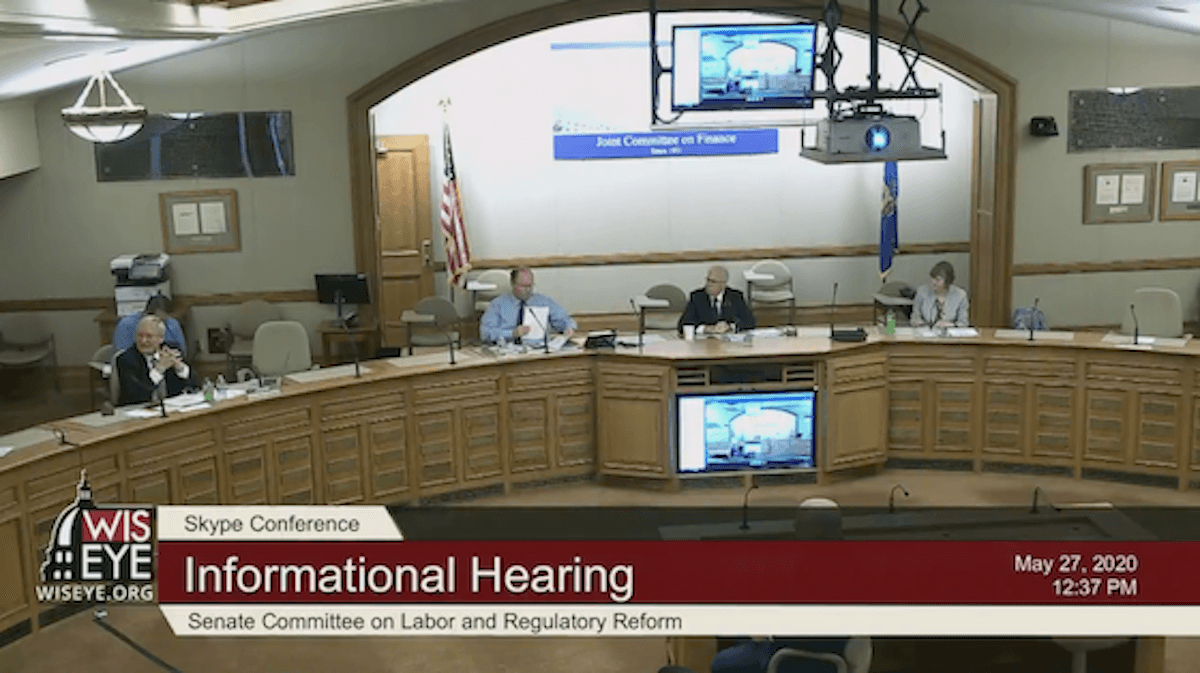
#image_title
Old software introduces payment errors when data entry, processing occur at same time.
Republican lawmakers learned Wednesday an antiquated software system that uses computer programming language developed in the early 1950s is preventing the state from taking one of their suggestions to tackle the backlog by operating call centers 24 hours a day.
The Senate Committee on Labor and Regulatory Reform held a hearing to obtain information on why the state was not better prepared to handle the influx of claims resulting from the loss of employment following the COVID-19 public health crisis.
Since March 15, several days after a public health emergency was declared by the governor, roughly 2.3 million unemployment claims have been filed by state residents. There is a backlog of 728,000 claims.
“I think where my frustration is coming from is I’m seeing bankers’ hours being put in on the phones. And we could easily and should be having phones open 24/7 and bringing as many people in as we can to handle those phones,” said committee member Sen. Chris Kapenga, R-Delafield.
Neeraj Kulkarni, the chief information officer and IT director with the state Department of Workforce Development said the department’s antiquated system prevents two different workflows from happening at once. In this case, the system essentially has to shut down at 6 p.m. to process all the data entered throughout the day. While this is happening, new data cannot be entered into the system, Kulkarni said.
“The antiquated system requires the claim entry system to stop,” Kulkarni told committee members. “If data is entered into the system while the batch is running ( a large quantity of employment data is being processed), errors will be introduced. There is a risk for incorrect payments to be distributed.”
Kulkarni’s explanation of the shortcomings of the department’s software came more than 90 minutes into the hearing and brought a moment of silence to the room.
COBOL, or Common Business-Oriented Language, is so much older than other programming languages that many universities stopped teaching it in the 1980s.
Kulkarni said he previously worked for the state Department of Revenue and helped modernize that department’s computer system over the course of 10 years. Because of the upgrade, taxes and refunds can be processed at the same time.
“Because it is not the COBOL system, you can have multiple work lanes actually functioning simultaneously,” he told committee members.
Scott Manley, the executive vice president of government affairs for Wisconsin Manufacturers & Commerce, also has served on the state’s unemployment advisory council since 2013.
He said an ask has never been made by the DWD for a massive overhaul of its computer system. Manley said he was aware DWD Sec. Caleb Frostman began looking into what that would involve at the end of 2019.
“It would be our hope to make a recommendation to improve and modernize the system as soon as we can,” Manley told the committee.
Sen. Bob Wirch, D- Somers, reminded his fellow committee members of an audit conducted in the 2013-2014 fiscal year that showed the department was struggling with backlogs seven years ago while Republicans were heading every level of government.
“Let’s remember for the past 10 years Republicans have controlled the purse strings, controlled the Legislature and controlled the Joint Finance Committee,” Wirch said. “Yet nothing was done for six years to update that antiquated technology.”
Nass responded by saying a number of Republicans and Democrats criticized then Gov. Scott Walker at that time following the audit’s findings.
“It wasn’t pretty and we criticized him. But right now, there is silence on the other side,” Nass said.
Nass did not directly respond to Wirch’s statements that the Republicans have the ability to spend money on a new system but have chosen not to do so in the 10 years they have been in control of the Legislature.
On May 22, the nonpartisan Legislative Council provided a list of legislative actions that have changed the state’s unemployment insurance laws from 2011 to the present.
Those changes, outlined here, made it more challenging and time consuming for claims to be processed when the state’s unemployment rate jumped from just over 3 percent in March to 14 percent in April.
Some changes made by Republicans, such as the one-week waiting period to receive an unemployment check, held up the state’s ability to access federal CARES funding, while the passage of the lame-duck legislation a month before Gov. Tony Evers took office put restrictions on his administration’s ability to increase eligibility guidelines to receive unemployment benefits.
“Blaming problems on Republicans for what is taking place is frankly a bunch of B.S.,” Kapenga said.
Senate Minority Leader Janet Bewley, D-Mason, said Senate Republicans offered no solutions at the hearing and tried to hide the fact that for years they enacted policies to limit and restrict access to unemployment benefits.
“This pandemic is revealing how challenges within the Wisconsin unemployment system were caused by Republican policies and further exasperated by their inaction,” said Bewley in a statement. “No matter how hard they try to rewrite their own history, the fact remains that Republicans have spent years tightening and restricting access to unemployment benefits.”

Medical debt will no longer appear on credit reports for all Americans
This new rule will erase an estimated $49 billion in unpaid medical bills from the credit reports of roughly 15 million Americans, according to the...

Sick of hidden fees on concert tickets and hotel stays? A new federal rule bans them.
Now, live event businesses and hotels must clearly list their prices in both their advertising and pricing information. American consumers on...

Trump’s tariff plan would raise prices and ‘reduce the living standard of Americans,’ economists say
Trump’s plan would effectively be a sales tax that disproportionately harms working-class families and could cause a trade war that hurts US...

Trump’s tariff and tax plan would raise taxes on 95% of Americans, report finds
In response to the report, the Harris-Walz campaign released an analysis of its own, outlining how Trump’s agenda would raise costs for nearly 2.5...




